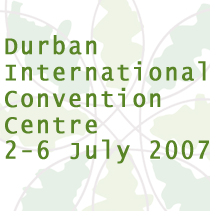|
Disabled Facilities
If you require disabled facilities, please notify the Congress Secretariat, The Conference Company.
Liability
The Congress Organisers have taken all reasonable care in making arrangements for the Congress, including accommodation and technical visits. In the event of unforeseen disruptions, neither the Congress organisers nor WEEC 2007 can be held responsible for any losses incurred by delegates. The programme is correct at the time of printing, but organisers reserve the right to alter the programme if and when deemed necessary. The Congress organisers act as agents only in securing hotels, transport and travel services, and shall in no event be liable for acts or omissions in the event of injury, damage, loss, accident delay or irregularity of any kind whatsoever during arrangements organised through contractors or by the employees of such contractors. Hotel and transportation services are subject to the terms and conditions under which they are offered to the general public. Delegates should make their own arrangements with respect to personal insurance. The Congress organisers reserve the right to make changes as and when deemed necessary, without prior notice to the parties concerned. All disputes are subject to resolution under South African Law.
Limit on Numbers
Attendance at some sessions, social events and tours may be restricted in numbers. It is strongly recommended that you book for these functions with your registration to avoid disappointment. Preference will be given in sequence as registrations are received.
Safety and Security
Like many major cities, Durban has both good and bad areas. It is advisable when walking in Durban, particularly at night, that one should be aware of people around you, and ideally you should not walk alone but in a group. Ostentatious displays of wealth should be avoided, and it is not advisable to look like a typical 'tourist' with many cameras strung around your neck. Do not leave valuables unattended.
Weather
The weather in July is normally mild and pleasant, with daily temperatures ranging between 10-23ºC during the day and 5ºC - 10ºC overnight. It is recommended that you bring warm clothes for the evenings and a jacket or raincoat.
VAT
Value Added Tax (VAT) at the rate of 14% is levied on most goods and services and is included in the display price of most goods. International visitors are encouraged to keep their slips as they can reclaim VAT on goods (not services) priced higher than R250.00 at the airport on departure, some harbours and at Customs Offices.
Visas
Visas are not required for citizens of most European countries and many other countries. A valid passport is required. A list of countries that currently do not require a visa can be found at the South African Government website (http://home-affairs.pwv.gov.za/migration/visa/schedule.htm). Participants requiring a visa for entry into South Africa are strongly advised to make their applications in their home countries at least three months before their intended date of travel. For more information please contact your nearest embassy or South African Consulate or consult your travel agency. Delegates wishing to travel to South Africa's neighbouring countries and back to South Africa are advised to apply for a multiple-entry visa. Passengers travelling to South Africa are required to have a minimum of two blank pages in their passport to enable the issuance of an entry visa. If there is insufficient space in the passport, entry will be denied and the passenger is likely to be detained pending return to their country of origin. Perhaps this is the time to renew those almost-full passports!
Health
There are no compulsory vaccination requirements for persons entering South Africa. However, certain areas of the country, including the North-Eastern half of KwaZulu-Natal are Malaria regions. Being July and mid-winter, these areas will be low risk but we still have to advise that if you anticipate travelling to a malaria area it is recommended that you take prophylactics before arrival and the necessary precautions while in the area (e.g. protective clothing, insect repellents). South African doctors and dentists are highly trained and hospitals are well equipped. It is strongly advised that delegates take appropriate health insurance prior to their departure. Yellow fever infected countries require inoculations to enter South Africa, i.e. Brazil, certain South American neighbouring countries and central Africa.
Time Difference
South Africa operates two hours ahead of Greenwich Mean Time throughout the year, making it an hour ahead of Central European Winter Time and seven hours in advance of Eastern Standard Winter Time.
Currency
Currency in South Africa is the Rand, denoted by the symbol R, with One Rand (R1) made up of 100 cents. Foreign currency can be exchanged at local banks and bureau de changes. All major credit cards such as American Express, Bank of America, Diners, Master Card, Visa and affiliates, are accepted in most places in South Africa. Generally, credit cards are not accepted for the purchase of petrol. Automatic Teller Machines (ATMs) offer a complete 24-hour service. Machines displaying international credit card logos can be used with the respective credit cards.
Useful Websites
|



